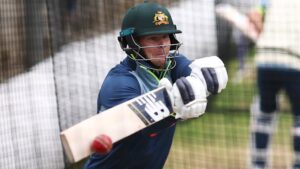
In a whimsical reflection on the quirks of school life and naming conventions, Stewart Copper of Maroubra humorously speculates on the potential for unusual first names. “Given that some new parents can have a rush of blood and call their hapless child a current popular word, how long will it be before we start hearing about some young fellow, surname Smith, with first name Nawaqanitawase?” Copper wonders, highlighting the trend of unique and sometimes challenging names.
Meanwhile, the nostalgia for school punishments of the past reveals a tapestry of creativity and discipline. Jenny Lyle of Collaroy recounts an incident from 1969, where her minor transgression of talking to boys on the bus and removing her hat and gloves led to an unusual punishment. “My punishment: I had to knit a six-inch square after school in detention. If it was not completed in the allotted time, I was to bring it in finished the next day. I couldn’t even knit in year 7, but since then, my knitting skills have resulted in a multitude of Aran jumpers,” she recalls.
Creative Discipline in Schools
In the 1960s, school discipline often took on a creative form, as Ian Graham of Lake Conjola remembers from his days at Bromley Technical School in Kent, UK. “In 1966, whilst at Bromley Technical school, the punishment was issued with a plimsoll [sandshoe] to the backside, delivered with gusto,” he shares, adding a personal connection to the arts master, Mr. Frampton, who was the father of musician Peter Frampton.
These anecdotes illustrate a time when school punishments were not only about discipline but also about instilling skills or leaving a memorable impact. The knitting punishment, for example, inadvertently equipped Jenny Lyle with a lifelong skill.
The Changing Landscape of School Roles
Reflecting on the roles within schools, Stuart Garland of Yamba reminisces about the once-revered position of ink well monitor. “I remember this job from my Mudgee Primary School days in the ’60s. Every desk had a small ink well that had to be topped up daily,” he writes. This role, now obsolete with the advent of the ballpoint pen, was a staple of classroom life, complete with the occasional mischievous act of dipping a ponytail into the ink.
The evolution from ink wells to ballpoint pens marks a significant shift in educational tools and practices, highlighting how technological advancements have streamlined classroom activities.
Quirky Thoughts and Cultural Reflections
Joy Cooksey of Harrington poses a thought-provoking question, “Would The Beautiful Poetry of Donald Trump and Vladimir Putin: Life Coach be found in the science-fiction section of book stores?” This playful inquiry underscores the intersection of politics, literature, and humor in contemporary culture.
Such reflections offer a lens through which to view the cultural shifts and the enduring human penchant for humor and satire. As society evolves, so too do the ways we engage with and interpret the world around us.
These narratives from the past not only entertain but also provide a window into the societal norms and educational practices of previous decades. As we look back, we gain insight into how far we have come and the enduring quirks that continue to shape our collective experiences.
The stories of yesteryear’s school life, with their unique punishments and roles, remind us of the ever-changing landscape of education and the timeless nature of human creativity and humor.





